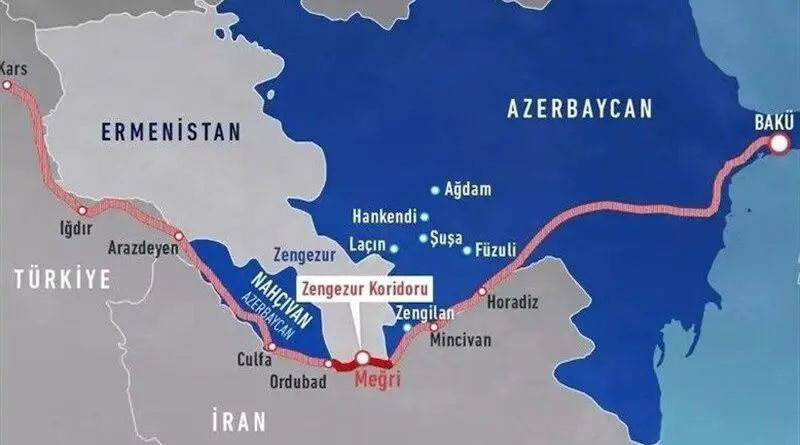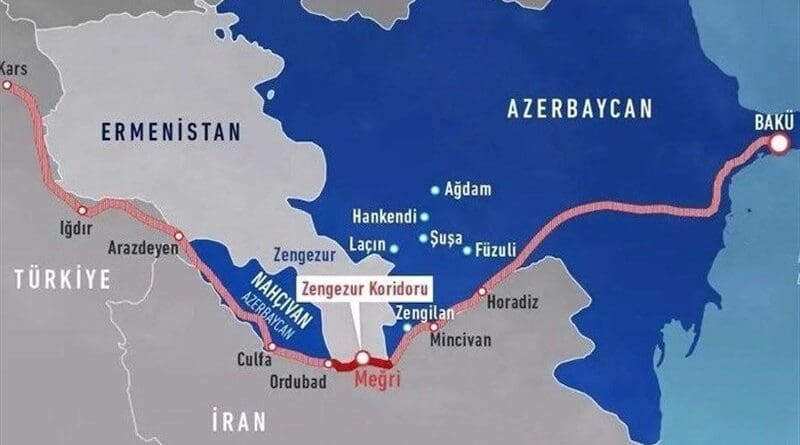

The Zangezur corridor is designed to link the Republic of Azerbaijan with Nakhchivan without Armenian checkpoints. Credit: Tasnim News Agency
Many in Iran have cautioned against the negative geopolitical consequences of the so-called Zangezur corridor that is designed to link the Republic of Azerbaijan with Nakhchivan without Armenian checkpoints, advising Russia to back off from endorsing the controversial idea.
In an interview with Russia’s Channel One during a visit to Baku on August 19, Russian Foreign Minister Sergei Lavrov pointed to a decision by Armenia and Azerbaijan Republic to set aside differences over the Zangezur corridor, amid discussions on a durable peace deal between the two states.
Also in a late August interview broadcast on Azerbaijani television, Lavrov lashed out at Armenia, alleging that Yerevan is reneging on an agreement signed in 2020 concerning the Zangezur corridor. “It is the Armenian leadership that is sabotaging an agreement signed by Prime Minister Nikol Pashinyan. It is difficult to understand the meaning of such a position,” he said.
Moscow, Baku and Ankara have been pushing for the creation of the Zangezur corridor since late 2020. The route would connect Azerbaijan and Turkey, with Russia serving as the security guarantor, according to eurasianet.
Meanwhile, Iranian officials have time and again expressed opposition to any change in the international boundaries or the geopolitics of the region.
In a telephone conversation with his Armenian counterpart on August 23, Iranian Foreign Minister Abbas Araqchi reaffirmed Tehran’s support for the territorial integrity of the regional countries, including Armenia, and highlighted Iran’s opposition to any change in the international boundaries.
According to informed sources, Iran’s ambassador to Moscow has recently voiced Tehran’s protest against the Russian Foreign Ministry’s stances on the Zangezur corridor.
In Iran, experts have advised Russia to bear in mind that Tehran is opposed to the creation of any corridor whatsoever that would connect Azerbaijan Republic to Nakhchivan through Armenia, saying Russians should not be surprised to hear about Iran’s legitimate, clear and unchanging views on this issue.
As a sovereign state that has always stood against the US, the Western governments and all hegemonic powers, Iran is sensitive about the South Caucasus developments and will never tolerate any change in the borders and its security margins.
Iran maintains that no rule would give priority to the security and geopolitical position of a single country in the South Caucasus region over the others. Therefore, Moscow should never expect to resort to the idea of the Zangezur corridor in order to settle disputes with Armenia.
Also, the creation of the Zangezur corridor will translate into the closure of one of Iran’s gateways to Europe and will reduce the number of Iran’s neighbors from 15 to 14.
Russia has been also advised to avoid taking measures that may impair the strategic relations between Moscow and Tehran, because the idea of the Zangezur corridor will create a new flashpoint near the very delicate boundaries of northwestern Iran.
Earlier, Russian Foreign Minister said on September 2 that Moscow and Tehran will complete work on a comprehensive inter-state agreement in the very near future. According to the diplomat, relations between the two countries are developing rapidly and a lot of bilateral projects are currently underway.